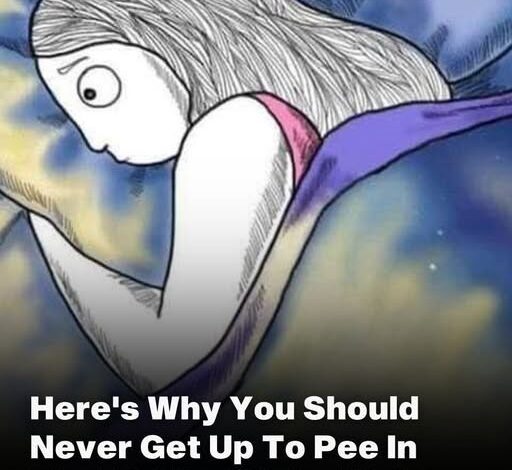Nighttime Urination: When Frequent Bathroom Trips Signal Health Concerns

Understanding Nocturia and Its Impact on Your Sleep Quality
Millions of Americans experience the frustrating cycle of waking up multiple times each night to use the bathroom. While this sleep disruption might seem like a minor inconvenience, medical experts warn that frequent nighttime urination could indicate serious underlying health conditions that require attention.
What Is Nocturia? A Common Sleep Disorder
Nocturia, the medical term for nighttime urination, occurs when individuals wake up more than once per night to urinate. This sleep disorder affects approximately 50 million Americans, making it one of the most common yet underdiagnosed health issues in the United States.
The condition disproportionately affects different age groups and genders. Women between ages 18-49 experience higher rates of nocturia compared to men in the same age range. However, after age 60, men become more susceptible to frequent nighttime bathroom visits due to prostate-related health issues.
The Science Behind Nighttime Urination Patterns
Your body’s natural sleep cycle plays a crucial role in urine production. During normal circumstances, your kidneys produce less urine at night, allowing for uninterrupted sleep. However, when this natural process becomes disrupted, it can lead to multiple bathroom trips throughout the night.
Research indicates that 88% of people experiencing nighttime urination suffer from nocturnal polyuria, a condition where the body produces a disproportionate amount of urine during nighttime hours. This disruption in normal kidney function can significantly impact sleep quality and overall health.
The REM Sleep Connection: Why Your Body Produces More Urine at Night
During Rapid Eye Movement (REM) sleep, your body naturally releases antidiuretic hormone (ADH), which helps reduce urine production. This biological mechanism allows for continuous, restorative sleep without bathroom interruptions.
When you don’t achieve adequate REM sleep, ADH levels remain low, causing your body to produce urine as if it were daytime. This hormonal imbalance creates a cycle where poor sleep leads to increased nighttime urination, which further disrupts sleep quality.
Health Conditions Associated with Frequent Nighttime Urination
Medical professionals emphasize that persistent nocturia often signals underlying health problems, including:
Bladder and Urinary System Issues:
- Overactive bladder syndrome
- Urinary tract infections
- Bladder capacity problems
- Kidney disease
Hormonal and Metabolic Conditions:
- Diabetes mellitus
- Diabetes insipidus
- Thyroid disorders
- Sleep apnea
Cardiovascular Health Problems:
- High blood pressure
- Heart failure
- Fluid retention disorders
Age-Related Health Changes:
- Prostate enlargement in men
- Hormonal changes in women
- Decreased kidney function
The Hidden Health Risks of Sleep Disruption
Frequent nighttime urination creates a domino effect on your overall health. When you consistently miss REM sleep, your body cannot perform essential repair and recovery functions. This sleep deprivation can lead to:
- Weakened immune system
- Increased risk of cardiovascular disease
- Mental health issues including depression and anxiety
- Cognitive impairment and memory problems
- Increased accident risk due to daytime fatigue
Evidence-Based Strategies for Better Sleep Quality
Healthcare providers recommend several lifestyle modifications to improve sleep quality and reduce nighttime bathroom visits:
Sleep Hygiene Optimization:
- Maintain consistent bedtime and wake-up schedules
- Create a relaxing pre-sleep routine
- Ensure your bedroom environment promotes quality sleep
- Limit screen time before bedtime to prevent blue light exposure
Dietary and Hydration Management:
- Reduce caffeine and alcohol consumption, especially in the evening
- Avoid large meals within two hours of bedtime
- Monitor fluid intake in the hours before sleep
- Consider timing of medications that may affect urination
Physical Activity and Wellness:
- Engage in regular exercise to promote better sleep
- Avoid vigorous workouts close to bedtime
- Practice stress-reduction techniques like meditation or yoga
- Maintain a healthy weight to reduce pressure on the bladder
When to Seek Medical Attention for Nighttime Urination
While occasional nighttime bathroom trips are normal, certain symptoms warrant medical evaluation:
- Waking up three or more times per night consistently
- Difficulty returning to sleep after urination
- Daytime fatigue affecting work or daily activities
- Changes in urine color, smell, or consistency
- Pain or burning during urination
- Sudden onset of frequent nighttime urination
Treatment Options and Medical Interventions
Healthcare providers offer various treatment approaches based on the underlying cause of nocturia:
Behavioral Therapies:
- Bladder training exercises
- Pelvic floor muscle strengthening
- Scheduled bathroom visits
- Fluid management strategies
Medical Treatments:
- Prescription medications for overactive bladder
- Hormone replacement therapy when appropriate
- Treatment of underlying health conditions
- Surgical options for structural problems
The Importance of Professional Health Assessment
Don’t dismiss frequent nighttime urination as a normal part of aging or a minor inconvenience. This symptom often serves as an early warning sign for treatable health conditions. Early intervention can prevent complications and significantly improve your quality of life.
Conclusion: Taking Control of Your Sleep Health
Nighttime urination affects millions of people, but it doesn’t have to control your life. By understanding the connection between sleep quality and urinary patterns, you can take proactive steps to address this health concern. Whether through lifestyle modifications or medical treatment, solutions exist to help you achieve the restful sleep your body needs for optimal health and well-being.
Remember that persistent sleep disruption from nighttime urination deserves medical attention. Your healthcare provider can help identify underlying causes and develop a personalized treatment plan to restore your sleep quality and overall health.